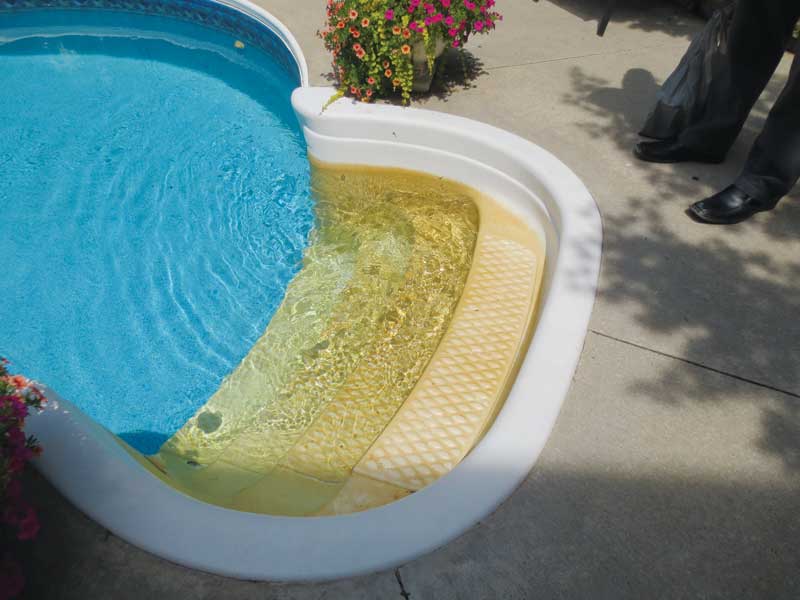Tell-Tale Signs That Your Pool Water Is Unbalanced

As pool owners and pool professionals at Royal Pools G2 Landscaping, we know just how much of a day-ruiner it can be to cancel a swim day due to cloudy water. Cloudy pool water indicates that the water is not chemically balanced.
When pool water becomes unbalanced, it can lead to several serious problems that affect water quality, swimmer comfort, and even the longevity of pool equipment, if not remedied quickly.
Clear water can also be deceiving. Test your pool water at least 2-3 times a week… more if you have a heavy swimmer load. A clear pool can hold a lot of contaminants or even be acidic.
Staying on top of the water chemistry will prevent this from happening, but you need to know what to look for.
At RPG2, we take pride in offering homeowners a backyard experience that will last for years. We know you want to maximize your rest and relaxation. Mastering pool water chemistry will make this possible. With that being said, what are the signs that your pool water is unbalanced?
Hazy or Cloudy Water
As previously stated, one of the most obvious signs of unbalanced pool water is a hazy or cloudy appearance.
A pool can turn cloudy for several reasons, including:
- High pH
- High calcium hardness
- Poor filtration
- An excess of contaminants prevents chlorine from working
- High cyanuric acid prevents chlorine from working
In any case, if your pool water is not crystal clear, it’s time to check the chemistry. Inspect the filter if the pool doesn’t clear; it may need cleaning or replacement parts.
Balanced Pool Chemistry:

- Free Chlorine: 1 – 3 PPM
- pH: 7.2 – 7.8
- Alkalinity: 80 – 120 PPM
- Calcium Hardness: 175 – 350 PPM
- Cyanuric Acid: 30 – 50 PPM
Skin and Eye Irritation
Swimmers experiencing red and irritated eyes or dry, itchy skin may be swimming in water with an improper pH or chlorine level. If the pH is too high or too low, or if chlorine levels are off, it can lead to discomfort and irritation.
Algae Growth
Hardly a surprise here, but the presence of algae in your pool is a major indication that your water is unbalanced. Algae thrive in conditions where chlorine levels are low or pH and alkalinity are out of range.
Green, yellow, or black algae can sprout if left unchecked. To prevent algae growth, make sure your sanitizer levels are in the proper range, and brush the pool wall and floor every week.
Stains or Scaling

Stains on pool surfaces or scaling on walls and equipment indicate an imbalance in calcium hardness or pH. Scaling is often the result of high calcium levels, while staining can occur due to metals in the water reacting with pool chemicals. Regular testing and the use of metal-controlling chemicals can help prevent these issues.
Excessive Chlorine Odor
A strong chlorine smell is often mistaken as a sign that there is too much chlorine in the pool. This is not the case. A strong chlorine smell around your pool comes from chloramines, which are dispersed into the air as the chlorine in your pool dies off.
Chlorine can die off due to improper CYA levels, or a massive amount of swimmers in the pool at one time. A chlorine smell indicates that the pool may need to be shocked to restore maximum chlorine effectiveness. So next time you smell chlorine around a pool, remember that it probably needs more chlorine.
Water Won’t Hold Chlorine
If your pool water seems to burn through chlorine too quickly, it could be due to high levels of organic contaminants or an imbalance in cyanuric acid (stabilizer). If your pool water refuses to hold chlorine, it is going to require a massive shock treatment. Regular chlorine testing and adjustments, along with periodic shock treatments, can help prevent this issue from occurring.
Conclusion on Unbalanced Pool Water
Treating pool water chemistry is a delicate process that requires significant care and precision. Such is required with the commitment to an inground swimming pool. Or, of course, you can hire a pool service company to do the majority of the work for you. This doesn’t mean, however, that you shouldn’t test your water on your own and monitor the water.
Taking the extra steps to maintain proper water chemistry throughout the week will ensure that your pool is always clear and swim-ready. Trust us, it’s worth it. If you have more pool questions, head over to our learning hub, where you will find all types of educational articles and videos on pools, concrete, landscaping, and more! Let’s get you started on a few articles below:
Pool Water Test Strips vs. DPD Test Kits vs. Digital Water Labs: Which is Best?
pH and Its Harsh Effects On a Pool
Written by Logan Edgemon
